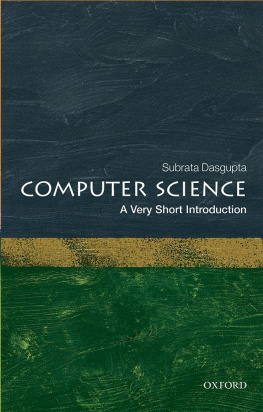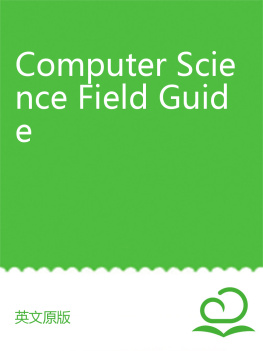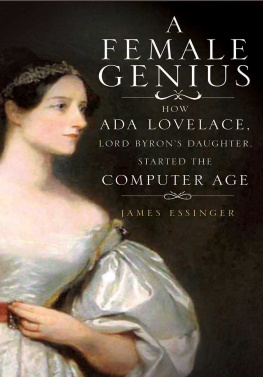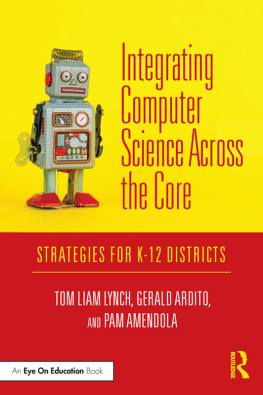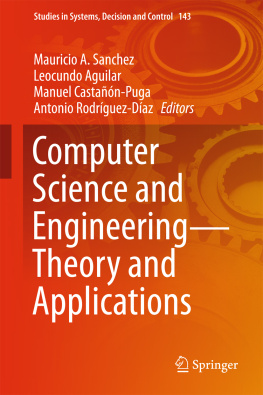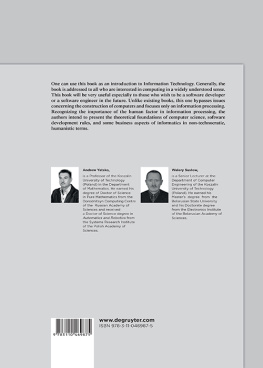IT BEGAN WITH BABBAGE
It Began with Babbage
THE GENESIS OF COMPUTER SCIENCE
Subrata Dasgupta


Oxford University Press is a department of the University of Oxford.
It furthers the Universitys objective of excellence in research, scholarship,
and education by publishing worldwide.
Oxford New York
Auckland Cape Town Dar es Salaam Hong Kong Karachi
Kuala Lumpur Madrid Melbourne Mexico City Nairobi
New Delhi Shanghai Taipei Toronto
With offices in
Argentina Austria Brazil Chile Czech Republic France Greece
Guatemala Hungary Italy Japan Poland Portugal Singapore
South Korea Switzerland Thailand Turkey Ukraine Vietnam
Oxford is a registered trademark of Oxford University Press
in the UK and certain other countries.
Published in the United States of America by
Oxford University Press
198 Madison Avenue, New York, NY 10016
Oxford University Press 2014
All rights reserved. No part of this publication may be reproduced, stored in a retrieval system, or transmitted, in any form or by any means, without the prior permission in writing of Oxford University Press, or as expressly permitted by law, by license, or under terms agreed with the appropriate reproduction rights organization. Inquiries concerning reproduction outside the scope of the above should be sent to the Rights Department, Oxford University Press, at the address above.
You must not circulate this work in any other form
and you must impose this same condition on any acquirer.
Library of Congress Cataloging-in-Publication Data
Dasgupta, Subrata.
It began with Babbage : the genesis of computer science / Subrata Dasgupta.
pages cm
Includes bibliographical references.
ISBN 9780199309412 (alk. paper)
1. Computer scienceHistory19th century. 2. Computer scienceHistory20th century.
I. Title. II. Title: Genesis of computer science, 18191969.
QA76.17.D36 2014
004.09dc23
2013023202
9 8 7 6 5 4 3 2 1
Printed in the United States of America
on acid-free paper
To Amiya Kumar Bagchi
Contents
IN RETROSPECT, I now realize that this book on the genesis of computer science had its own genesis somewhere in my subconscious in summer 1977, when I was a visiting scientist in the Cambridge University Computer Laboratory. There, I had my first of many meetings with Maurice Wilkes, and it is also where I met David Wheeler. Twenty-eight years earlier, Wilkes, Wheeler, and their colleagues had designed and built the EDSAC, the worlds first fully operational stored-program computer. As a graduate student, I had become seriously interested in the history and cognitive nature of scientific creativity, but computer science seemed different. For one thing, unlike physics, chemistry, or biology, the history of which stretched back centuries, the originators of computer science were, mostly, still living and active. When talking to Wilkes and Wheeler that summer, two pioneers, I was privy to a kind of oral history of our discipline.
Throughout the succeeding decades, my interest in the history and cognitive nature of science meandered in different directions, but I continued to think about computer science. Under the influence of Herbert Simons The Sciences of the Artificial, I came to glimpse something about the nature of the discipline. I remember a conversation with B. Chandrasekaran of Ohio State University sometime during the early 1980s when we were, briefly, colleagues. Chandra said that computer science still had no intellectual tradition in the manner of physics or mathematics or chemistry. This obscurely disturbed me, but other preoccupations both within and outside computer science prevented me from pursuing this issue which, it seemed, required serious inquiry.
In November 2010, Wilkes passed away, and his death prompted me to give a lecture about him titled The Mind of a Computer Pioneer in the Center for Advanced Computer Studies at my university. After the talk, some graduate students approached me to offer a seminar course on the birth of computer science. An early draft of this book formed the basis for the course, which I taught in Fall 2011.
So I am indebted to Duane Huval, Charles LeDoux, Craig Miles, and the late Michael Sharkey for stimulating me in writing this book. They were the first responders to its contents. Their feedback was most valuable.
I have had the good fortune of many conversations with Maurice Wilkes, and conversations and lengthy e-mail discussions with the Herbert Simon, a polymath for our times on the origins of artificial intelligence. I was also privileged to know Donald Cardwell, historian of science and technology, when I was teaching at the University of Manchester Institute of Science and Technology during the early 1990s. These encounters have shaped my thinking, in different ways, on the historical, cognitive, and creative aspects of science, especially computer science. I have no doubt that their influence on me has found its way into this book.
I thank Simon Lavington, who made available to me a scarce, historical account of the Manchester University computers and for allowing me to read an unpublished paper by him on the Manchester machines. I thank D. F. Hartley for information on the academic status of computing during its earlier days in Cambridge.
Three anonymous reviewers, who read first drafts of the first few chapters on behalf of the publisher, offered very thoughtful comments. I thank them, as well.
Thank you, Jeremy Lewis, my editor at Oxford University Press who has been with this project from the day he received my first communication. It has been a pleasure working with him.
Thanks to Erik Hane, also of the editorial staff at Oxford University Press for all his help.
Thank you Terry Grow, a young artist who produced the images that appear in this book.
Bharathy Surya Prakash supervised all stages of the physical production of the book. Her professionalism was noteworthy. I thank her and her production team.
My thanks to Oxford University Press for giving me permission to adapt two diagrams (Figure 8.5, p. 135; Figure 8.7, p. 147) from Technology and Creativity (1996) authored by me.
Finally, as always, thank you Mithu, Deep, and Shome.
IT BEGAN WITH BABBAGE
I
IN 1819, a young English mathematician named Charles Babbage (17911871) began to design a machine, the purpose of which was to compute and produce, fully of its own steam, certain kinds of mathematical tables. Thus came into being the idea of automatic computationperforming computations without human interventionand an intellectual tradition that eventually gave birth to a brand new and very curious scientific discipline that, during the late 1960s, came to be called computer science. This book tells the story of its genesis, a long birth process spanning some 150 years, beginning with Babbage and his dream of automatic computation.
The focus of every science (in fact, every intellectual discipline) is a certain kind of reality, a certain class of phenomena. The focus of computer science is the phenomenon called computation, which refers both to a concept and an activity that is associated historically with human thinking of a certain kind. The Latin root of the English word compute is computaremeaning, reckoning, calculating, figuring out. Thus, according to etymology, computation refers to the idea and the act of reckoning or calculating.
Next page

